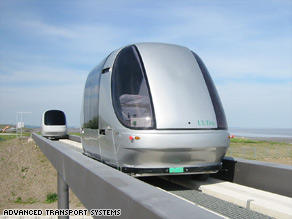| Where are the podcars? | 2008-10-14 20:33 6 comments |
 by Flemming Funch by Flemming FunchCNN: City hopes to shuttle people in futuristic 'podcars' Unlike mass transit, podcars carry two to 10 passengers, giving travelers the freedom and privacy of their own car while reducing the use of fossil fuels, reducing traffic congestion and freeing up space now monopolized by parking.Yeah, sounds great. But "not entirely new" is a bit of an understatement. I feel cheated. Where's my future? When I was a kid, in the 60s, my mother subscribed to a popular science magazine called "Vor Viden" (Danish for "Our Knowledge"). Which every month was chock-full of exiting technological marvels that were just around the corner. Like, exactly this pod car scenario. According to that magazine, there had already been test tracks constructed in Germany and other places, and there were photos, which looked very much like these photos. It all sounded very promising, like it would be coming to my neighborhood in a few years. But we're talking about the mid 60s. 40 years ago. It obviously didn't happen so far, and maybe you can understand if I'm a bit skeptical when I read almost the exact same article four decades later, and I'm supposed to believe it. I'd like to believe. But there were also functioning flying cars in the 1960s. And amphibian cars. And we went to the moon in the 1960s. And to the bottom of the Mariana Trench. I'd have expected that we would have gotten a bit further along those lines since then, but it hasn't been much. But we have color TV. Oh, and the internet and mobile phones. Some things are actually better than predicted in the popular science magazines of the 60s. But it is a little silly and unexpected that we're still driving cars with motors that run on exploding fossils. And that we sit and push pedals and turn steering wheels. Seems a bit like the Flintstones, which incidentally was one of my favorite TV program in the 60s. I had just hoped for the Jetsons. |